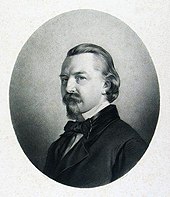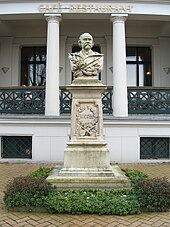Friedrich Wilhelm Kücken
Friedrich Wilhelm Kücken (born November 16, 1810 in Bleckede , Lüneburg district , † April 3, 1882 in Schwerin ) was a German musician and composer of the Romantic era .
Life
Kücken first received lessons on flute, violin and piano from his father, who worked as an executioner . At the age of 15 he became a student of Friedrich Lührss in Schwerin , his father's son-in-law and father of the composer Carl Lührss .
In 1829 Kücken left Schwerin for Hamburg, where he wrote his first songs and piano duos. From 1836 to 1843 Kücken studied composition and singing in Berlin and was also a member of the Sing-Akademie zu Berlin during this time . He composed further duos for piano and violin (op. 12, 13, 16, 90).
In 1843 Kücken went to Switzerland, to Paris and in 1847 to Stuttgart, where he performed his opera The Pretender and from 1851 - initially alongside Peter Joseph von Lindpaintner , later alone - until 1861, he held the office of court conductor and earned great merits. He managed the opera and orchestra almost independently. Giacomo Meyerbeer said of him: "I have never found a conductor who studied more carefully and understood the musical intentions of others so easily and correctly than Kapellmeister Kücken." In 1862 Kücken gave up his position in Stuttgart and went back to Schwerin.
In 1885 , a monument with a marble bust based on a design by the sculptor Ludwig Brunow was erected in front of his former home, which he had left as a chick foundation to support young penniless musicians .
Kücken set numerous contemporary song texts to music, created piano, choral and stage works. His songs have been translated into numerous languages and were widely used internationally, especially in the USA. The most famous and popular thing today is probably: How is it possible then that I can leave you after a text by Helmina von Chézy .
Works
Songs
- Loreley : ballad; Poem by H. Heine for a bass part with accompaniment of the pianoforte, Op. 3.
- 6 songs Op. 14 for a voice with guitar accompaniment
- Slumber song
- Wanderlied
- The expectation
- Old love song
- The kiss
- Spring dance
- Tragedy . Poem in three sections by H. Heine fe singing voice m. Companion d. Pianoforte, Op. 10
- Barcarole: Drive Ship , Op. 15 No. 2.
- Twelve duets for two voices with piano accompaniment: Op. 8, 15, 21, 30.
- The fishermen: The skies blow from the bank ; for 2 voices with piano accompaniment.
- " Oh, how is it possible then ", text Helmina von Chézy .
- " Who wants to be among the soldiers ", text by Friedrich Güll
- Quartets for male voices, Op. 22nd
- In the morning when the roosters crow
- Rest sweet love in the shade
- Out in forest green
- Mr. cousin, oh Mr. cousin!
- 5-part songs for soprano, alto, tenor and bass, Op. 25, Berlin, Trautwein
- When violets are blue
- Listen! the lark in aether blue
- Su su Puthöneken
- He gets on the Alma
- I wanted to ride for a walk
- 5 songs Op. 34
- No. 1: You wonderful maiden!
- No. 2: The girl from Judah
- No. 3: Farewell
- No. 4: the rose
- No. 5: slumber song
- 4-part motet for Soprano I, Soprano II, Tenore and Basso, Op. 66
- Get up! Become light!
Piano works
- Grande Polonaise Brillante, Op. 4 for piano 4 hands
- Ten little character pieces for piano, op.113 (new edition Edition Massonneau 2014)
- Deux duos en forme des sonates pour pianoforte et violon concertant ou violoncelle ou flûte, Op. 16
- Great Sonata for Pianoforte and Violin, Op. 90, also published as Duo en forme de Sonata for piano and violoncello
Stage works
- The Flight to Switzerland (Libretto Carl Blum ), opera in one act Op. 24 (premiere February 26, 1839 Berlin).
- The pretender (libretto by Carl Philipp Berger ), romantic-comic opera in three acts (premiered April 21, 1847 Stuttgart).
- May magic (libretto Gustav von Putlitz ),
- Festival (premiere 1864 Schwerin).
Orchestral works
- Waldleben , concert overture for large orchestra, op.79 (new edition Edition Massonneau 2017)
literature
- Robert Eitner : Kücken, Friedrich Wilhelm . In: Allgemeine Deutsche Biographie (ADB). Volume 17, Duncker & Humblot, Leipzig 1883, pp. 290-292.
- Emanuel Scobel: Kücken, Friedrich Wilhelm. In: Ludwig Finscher (Hrsg.): The music in past and present . Second edition, personal section, volume 10 (Kemp - Lert). Bärenreiter / Metzler, Kassel et al. 2003, ISBN 3-7618-1120-9 ( online edition , subscription required for full access)
Web links
- Works by and about Friedrich Wilhelm Kücken in the catalog of the German National Library
- Sheet music and audio files by Friedrich Wilhelm Kücken in the International Music Score Library Project
- Works by and about Friedrich Wilhelm Kücken at Open Library
| personal data | |
|---|---|
| SURNAME | Kücken, Friedrich Wilhelm |
| BRIEF DESCRIPTION | German composer |
| DATE OF BIRTH | November 16, 1810 |
| PLACE OF BIRTH | Bleckede |
| DATE OF DEATH | April 3, 1882 |
| Place of death | Schwerin |

